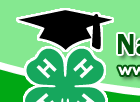Ag Consortium Liaison
Collegiate 4-H’s Ag Consortium Liaison serves on the Consortium of Collegiate Agricultural Organizations as the representative for the National Collegiate 4-H Organization along with serving on the Collegiate 4-H National Action Board. The position is two years long as there is an Ag Consortium Liaison-Elect appointed to shadow the existing liaison for a year before assuming the duties of the position.
Application for the 2007-2009 Ag Consortium Liaison– Due July 1, 2007
What is the Consortium?
The Collegiate 4-H Organization is one of 16 organizations that make up the Consortium of Collegiate Agricultural Organizations. The Consortium is mainly responsible for the creation of Collegiate LifeKnowledge. Launched in September of 2005, CLK is a leadership development program for college students designed to be taught by fellow college students. At national meetings across the country, collegiate students are being trained on how to best utilize this program for their agricultural organizations on campus. Developed as a shared interest by industry, government and the organizations of The Consortium, a taskforce identified the 4 cornerstone areas and lesson topics. These 4 corner stone areas of CLK are: personal, organizational, career and community. A team of writers made-up of professionals in agricultural education then created over 100 lessons. All lessons are activity-based and emphasize multiple intelligences. This all-inclusive leadership education package provides collegiate agricultural student organizations high quality materials that require little effort to use, while being engaging and educational.
The National Collegiate 4-H Organization will be involving each of our clubs in CLK training during the National Collegiate 4-H Conference in 2008. Collegiate LifeKnowledge operates under a train-the-trainer approach. After a club member completes the training during the National Conference (or at a regional conference), their club will receive a CD with the entire curriculum on it.
All of the groups involved in the consortium have an agricultural background, but their goal isn’t agriculturally directed. Samples of the Collegiate LifeKnowledge program include possible workshops dealing with teams and time management; there are around thirty to forty workshops available through this program.
Collegiate 4-H’s Ag Consortium Liaison serves on the Consortium. The position is two years long as there is a Ag Consortium Liaison-Elect appointed to shadow the existing liaison for a year before assuming the duties of the position.
Ag Consortium Liaison
Crystal Schauer
Iowa State University
You may contact our Ag Consortium Liaisons with more questions, by utilizing our Contact page and selecting "Ag Consortium Liaison."
Collegiate LifeKnowledge Lessons
The following are the topics covered in the Collegiate LifeKnowledge curriculum.
Personal Development Lessons
|
Organizational Development Lessons
|
Career
|
Community
|
Other Organizations of the Consortium of Collegiate Agricultural Organizations include:
- National Agricultural Communicators of Tomorrow (ACT)
- Agriculture Future of America (AFA)
- Alpha Gamma Rho
- Alpha Gamma Sigma
- Alpha Tau Alpha (ATA)
- Alpha Zeta
- Block and Bridle
- Collegiate FFA
- Farm House
- Minorities in Agriculture Natural Resources and Related Sciences (MANRRS)
- National Agricultural Alumni and Development Association (NAADA)
- National Agri-Marketing Association (NAMA)
- National Postsecondary Agricultural Student Organization (PAS)
- Professional Landcare Network (PLANET)
- Sigma Alpha

